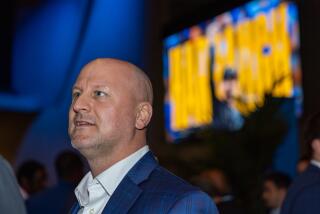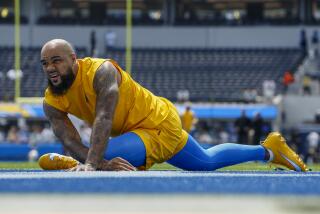The NHLâs Blacksmith : Bluesâ Coach Mike Keenan Has the Fire to Forge Players Into Teams
I am not going to leave New York. I am coach of the New York Rangers.
--Mike Keenan, June 13, 1994.
It came very easily. It was like going back to my old neighborhood.
--Keenan on July 17, 1994, after leaving Rangers to become coach and GM of St. Louis Blues.
*
Mike Keenan is unhappy, biting off his words as he analyzes his playersâ performance.
âTheyâre standing around and looking at each other, saying, âWeâve got a hell of a lot of talent so we donât have to work,â â he says. âTheyâre at a crossroads. They have to make up their minds what direction they want to go, whether they want to win or want the same old same old.â
Choose any year in the last 10 that Keenan has coached in the NHL, and he has made that speech. That day, he was talking about his Blues, but he said the same thing last year about the Rangers. And he said it about the Chicago Blackhawks and, before that, the Philadelphia Flyers.
Keenan has his ways.
He flatters the stars, prods the underachievers, drives players harder than they are used to being driven and gets them into top shape.
He challenges his bosses, exasperating them with his insistence on doing things his way.
But mostly, he wins.
Keenan, 45, took the Flyers to the finals twice and the Blackhawks once before he led the Rangers to the Stanley Cup last spring, their first since 1940. They might have won to spite him, but win they did.
And now, Keenan has the Blues in second place in the Central Division, again after bruising player egos and clashing with his bosses.
âIn this profession, weâre judged on how we do in the playoffs,â said St. Louis assistant Ted Sator, who worked with Keenan in Philadelphia. âWith Mike, thereâs not a lot of gray. Thereâs black and white. And thereâs one direction he steers his team--toward getting ready for the playoffs.â
Thatâs why the Rangers hired him. They had missed the playoffs in 1992-93, and he had been fired by the Blackhawks. The Rangers needed a coach who could handle stars and were willing to overlook his autocratic manner.
âI knew what potentially he could do when we hired him, good and bad,â Ranger General Manager Neil Smith said. âI was warned about him by many people. But those were drastic times, and that calls for drastic measures.â
It turned out to be a nerve-racking, tumultuous ride. Keenan benched key players, such as defensemen James Patrick and Brian Leetch, to emphasize that they needed to work to stay in the lineup. He stroked star center Mark Messier and pushed other players.
But it all worked. The Rangers won the Cup and Leetch was voted the most valuable player in the playoffs.
âItâs not all psychological ploys,â said St. Louis forward Greg Gilbert, who played for Keenan in Chicago and New York. âHe sets it up as challenges and he sees how guys respond. If he has to rip you on your backside, heâll do it, and I respect that. Iâd rather have somebody yelling at me, telling what Iâm doing wrong, than letting things go. But some people react differently.â
Messier, for instance, believed Keenan was pushing too hard, and they got into a shouting match outside the locker room during the Rangersâ semifinal series against the New Jersey Devils. When Messier guaranteed before Game 6 that the Rangers would win the series, the consensus was that he rallied them to show Keenan.
âIf I was put into that situation again, if you put me into a time clock, Iâd (hire Keenan) again because it was the best thing for the New York Rangers,â Smith said. âIt was hard at times, but you get many years of looking at your Stanley Cup ring.â
The Rangers won the Stanley Cup on June 15. Fansâ euphoria was summed up by a sign at Madison Square Garden after the teamâs seventh-game victory over the Vancouver Canucks: âNow I can die in peace.â
The celebrations were still going strong July 15, when Keenan declared that the Rangers had breached his contract by failing to pay him a bonus due within a month of the finale and declared himself a free agent. After talking to the Detroit Red Wings, he signed with the Blues for a reported $9 million for five years, ignoring his five-year Ranger contract. Some sources say the deal is worth $12 million over six years.
The league didnât take kindly to Keenanâs jump, suspending him for 60 days and fining him $500,000.
Smith said he was shocked that Keenan left over what Smith called a clerical thing.
âIn the five years Iâve been here, bonuses have never been on time,â Smith said. âI never knew what on time was. . . . When that happened, I reviewed other instances, and bonuses have never been on time.â
Keenan, however, said it was the last in a series of affronts, although he would not specify the others.
And now, he is trying to make it all work again in St. Louis.
Hoping that if money canât buy happiness it can at least rent the Stanley Cup, the Blues gave Keenan a team whose $23-million payroll is the second-highest in the NHL.
Brett Hull, the dynamic but sometimes lethargic right wing, was so sure he would hate Keenan that he considered asking to be traded. So far, however, they have coexisted in relative peace.
Keenanâs strategy has been to boost Hullâs ego by giving him penalty-killing duty for the first time in his career and moving him to center, where he has more responsibility. If that also means Hull canât blame his center if he doesnât score, so much the better for Keenan later.
âHeâs trying to figure out what heâs got to work with in the minors and here, and heâs trying to change the philosophy weâve played with in St. Louis,â Hull said. âHeâs learning what players respond to. Heâs smart. He lets you play. Itâs different for me because Iâm whatâs considered a star player.â
But Keenan didnât let Craig Janney play. A gifted playmaker who assisted on 21 of Hullâs 57 goals last season and 24 of Brendan Shanahanâs 52, Janney was benched by Keenan for showing too little intensity.
Janney left the team in disgust, then was traded to San Jose for defenseman Jeff Norton.
Scrappy forward Kevin Miller, who was also benched, joined Janney in San Jose on March 23. Both said Keenan never told them what they did wrong.
âI donât think my play or my attitude warranted what happened to me,â Janney said.
Said Keenan: âWhat I saw when I came into this thing, from my own experience, is that not everyone is going to fit into a certain system or style of play, and itâs best for that individual not to even be with the program because theyâre not going to be able to make the adjustment. Thatâs not unlike a president going into office or a new CEO going into a corporation. . . .
âAll the speculation was that Brett wasnât going to be able to make the adaptation, whereas it turns out, heâs probably the person on this club who has made the biggest adaptation and embraced change more than anyone else.â
Keenan backed down from his stern approach, though, on Shanahan.
Early last month, he said Shanahan wasnât justifying his $3-million salary and was âwaiting for someone to work for him. Weâre not going to tolerate that here.â
Shanahan, an enthusiastic and dependable player who missed the start of the delayed season because of a virus that affected his liver and spleen, was brought near tears.
âWhen Iâm not producing, Iâm going to push myself,â he said. âYou donât like hearing it. . . . (The next day,) we talked about each otherâs concerns and realized that both of us want the same things. Mikeâs still figuring out guys. I told him, âJust tell me to do something. You donât have to send an indirect message. Tell me. Iâll be receptive.â â
Keenan later acknowledged that Shanahan hadnât completely recovered from his illness and was nearing full stride.
But Keenan certainly wasnât finished seeing how far he could provoke people.
Referring to club Chairman Michael Shanahan--no relation to Brendan--and President Jack Quinn, Keenan criticized the paying of individual bonuses to players.
âThe management there has promoted superstar status without the team concept,â he said. âThey filled the building without developing a winning culture.â
Keenan softened his stance after meeting with Michael Shanahan, but if his intent was to jar his team out of its doldrums, it worked. Since then, the Blues are 6-1-1 and playing exemplary defense as the playoffs approach.
If the pattern is old, the incentive for Keenan is new. Winning the Cup a second time would move him to second among active coaches, behind only his mentor, Detroitâs Scotty Bowman, and would cement his reputation as a team builder.
âThe challenge now, as a manager, is to build an organization and win it with an organization that has never won it before,â he said. âThe culture of this team has to change. If it didnât have to change, the team would have been more successful than it has been.â
More to Read
Go beyond the scoreboard
Get the latest on L.A.'s teams in the daily Sports Report newsletter.
You may occasionally receive promotional content from the Los Angeles Times.







